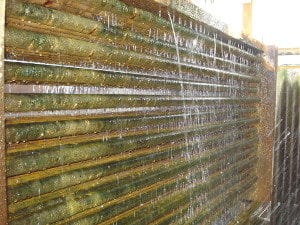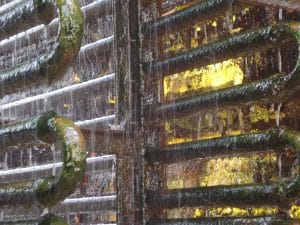Cooling Tower Chemicals
Robinson India’s comprehensive range of high performance cooling tower chemicals have been scientifically formulated to deliver significant operational benefits and performance improvements to cooling towers, and open and closed cooling systems that use water as a primary coolant.
For industrial companies using a cooling tower for its facility, some type of cooling tower water treatment system is usually necessary to ensure an efficient process and long equipment service life. If cooling tower water is left untreated, organic growth, fouling, scaling, and corrosion can reduce plant productivity, cause plant downtime, and require costly equipment replacements down the road.
To ensure such cooling towers are correctly maintained and operate at optimum efficiency it is essential that the correct cooling water conditions are established and then maintained at all times. This can be achieved using carefully selected cooling tower water treatment chemicals.

Why cooling tower chemicals are necessary ?
If your cooling tower is currently functioning as it should, you may feel that there is no need to bother with cooling tower water treatment. However, common issues like corrosion, contamination, and scaling can cause significant problems—and it is impossible to tell when or where these might occur. Fouling in a cooling tower can result in a complete loss of productivity, extended downtime, and significant hassle and expense for repairs.
This is why it is critical that you work with a skilled water treatment expert who can examine your unique cooling tower water treatment system and advise you on the next steps to take—whether that is to change your strategy or to incorporate a water treatment system for the first time. The upfront investment of time and money will more than pay off many times over in the long term thanks to increased longevity, efficiency, and effectiveness in your cooling tower.

Types of cooling tower chemicals
Nearly all cooling towers benefit from using cooling tower chemicals. These chemicals, which vary in both function and type, serve a number of purposes; primarily, they are meant to increase the longevity of the cooling tower and prevent issues like fouling, corrosion, and Legionella over time.
Corrosion Inhibitors

One of the primary issues that cooling towers face is corrosion and degradation of metal parts due to the natural breakdown forming rust and compounds that break down metal. Over time, corrosion will weaken the mechanical parts of a water tower and cause malfunctions, contamination of the water used in the tower.
The most common corrosion inhibitors are called bicarbonates. These materials protect metal components by neutralizing acidity in the water. Bicarbonates directly tackle common corrosive compounds such as chlorides and sulfates, which will eat away at a cooling tower’s structure and components over time.
Algaecides & Biocides

Another common issue that cooling towers face is the development of organic material. This may include anything from algae and biofilms to organic contaminants that have crept into the water due to leaks. Because these materials are actually alive, they can proliferate and overtake a cooling tower in a surprisingly short time. For this reason, most cooling towers are treated with some sort of biocide chemicals (anti-biotic) to prevent a sudden bloom or burst of organic life that fouls components in the system and can also cause health concerns.
Algaecides, as their name might suggest, is intended to kill algae and other related plant-like microbes in the water. Biocides can reduce other living matter that remains, improving the system and keeping clean and efficient water usage in a cooling tower. One of the most common options when it comes to biocides for your water is bromine.
Scale Inhibitors

Among the issues that cause the most damage and strain to a water tower’s systems is scaling. When an unwanted material or contaminant in the water builds up in a certain area, it can create deposits that grow over time. This can cause issues ranging from the narrowing of pipes to total blockages and equipment failures.
Scaling is typically caused by the presence of minerals in the water, and the water’s alkalinity will determine how much calcium carbonate scale you might expect. Silica is also known for creating large deposits that can impact the performance of your system. If scaling is an issue in your cooling tower, you may be able to tackle it using phosphoric acid.
Depending on the impurities present in your water, any combination of these cooling tower chemicals might best suit your facility and make up your treatment system, so it’s important to consult with your water treatment specialist to ensure the right system for your specific tower is being considered. Depending on the needs of your cooling tower and process, these standard components are usually adequate. However, if your tower requires a system that provides a bit more customization, there might be some features or technologies you will need to add on.
Conclusion
Robinson India has over 15+ years of experience helping our customers design and custom-engineer cooling tower water treatment systems. If you have any questions, be sure to call us for more information about cooling tower chemicals.
Connect with us
Hey ! We are looking forward to start a project with you
Whether you have questions related to RO Plant, DM Plant, ETP, STP, or service & maintenance of existing water treatment plants. Our Team is always ready to provide solutions for all your needs.
Email :
Call us
+91 9811483920
+91 8178276169
Office Address
B-2/314, Tara nagar, Old Palam Road, Near Ram Mandir, Dwarka Sec-15, New Delhi. Pincode : 110078
Business Hours
Mon to Fri : 8 AM to 6 PM
Saturday : 9 AM to 4 PM
Sunday : Off